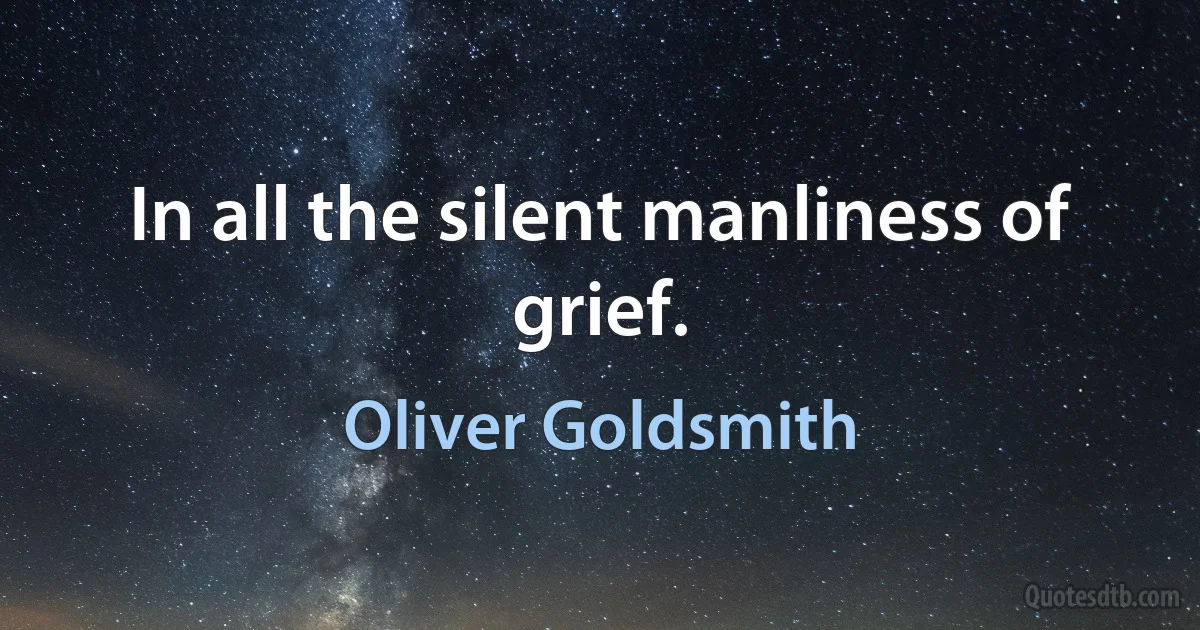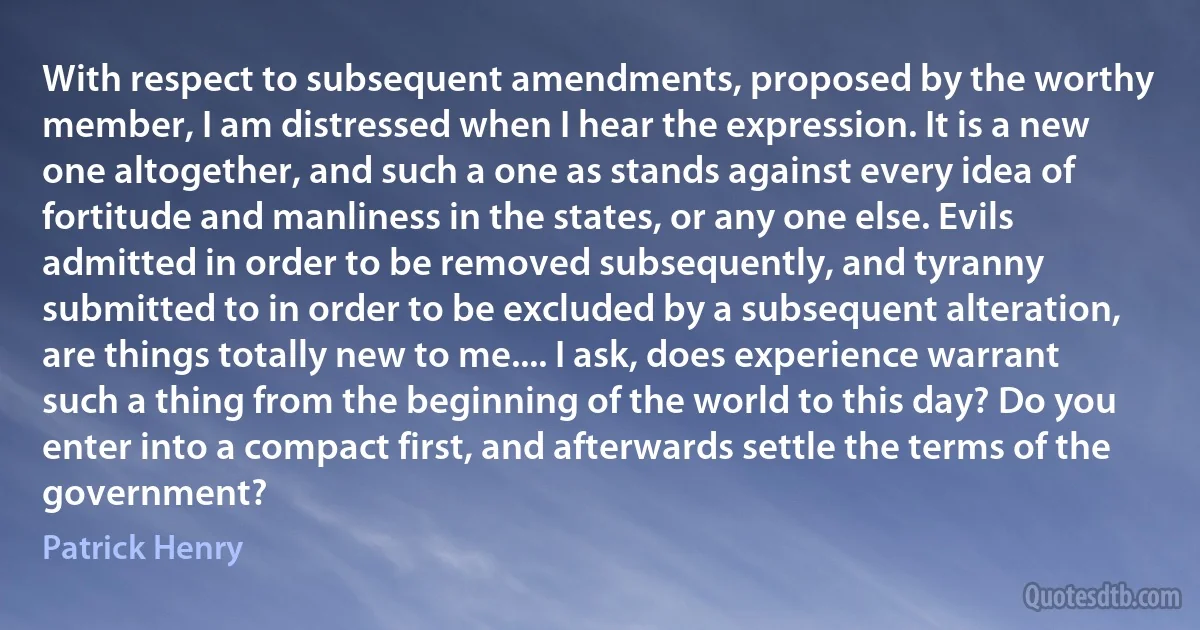Manliness Quotes
I judge a man by his actions with men, much more than by his declarations Godwards - When I find him to be envious, carping, spiteful, hating the successes of others, and complaining that the world has never done enough for him, I am apt to doubt whether his humility before God will atone for his want of manliness.

Anthony Trollope
Christ's whole life on earth was the assertion and example of true manliness - the setting forth in living act and word what man is meant to be, and how he should carry himself in this world of God - one long campaign in which the "temptation" stands out as the first great battle and victory.

Thomas Hughes
Now see what a Christian is, drawn by the hand of Christ. He is a man on whose clear and open brow God has set the stamp of truth; one whose very eye beams bright with honor; in whose very look and bearing you may see freedom, manliness, veracity; a brave man--a noble man--frank, generous, true, with, it may be, many faults; whose freedom may take the form of impetuosity or rashness, but the form of meanness never.

Frederick William Robertson
Naturally, grown-up citizens are concerned about the beatniks and delinquents. ... The question is why the grownups do not, more soberly, draw the same conclusions as the youth. Or, since no doubt many people are quite clear about the connection that the structure of society that has becoming increasingly dominant in our country is disastrous to the growth of excellence and manliness, why don't more people speak up and say so?

Paul Goodman
To fight for the right, to abhor the imperfect, the unjust, or the mean, to swerve neither to the right hand nor to the left, to care nothing for flattery or applause or odium or abuse-it is so easy to have any of them in India-never to let your enthusiasm be soured or your courage grow dim, but to remember that the Almighty has placed your hand on the greatest of His ploughs, in whose furrow the nations of the future are germinating and taking shape, to drive the blade a little forward in your time, and to feel that somewhere among these millions you have left a little justice or happiness or prosperity, a sense of manliness or moral dignity, a spring of patriotism, a dawn of intellectual enlightenment, or a stirring of duty, where it did not before exist-that is enough, that is the Englishman's justification in India. It is good enough for his watchword while he is here, for his epitaph when he is gone. I have worked for no other aim. Let India be my judge.

George Curzon, 1st Marquess Curzon of Kedleston
Ernest Bevin had many of the strongest characteristics of the English race. His manliness, his common sense, his rough simplicity, sturdiness and kind heart, easy geniality and generosity, all are qualities which we who live in the southern part of this famous island regard with admiration.

Ernest Bevin
[I]n this life-long fight, to be waged by everyone of us as single-handed against a host of foes, the last requisite for a good fight, the last proof and test of our courage and manfulness, must be loyalty to truth - the most rare and difficult of all human qualities. For such loyalty, as it grows in perfection, asks ever more and more of us, and sets before us a standard of manliness always rising higher and higher.

Thomas Hughes
One of the prime dangers of civilization has always been its tendency to cause the loss of virile fighting virtues, of the fighting edge. When men get too comfortable and lead too luxurious lives, there is always danger lest the softness eat like an acid into their manliness of fibre. The barbarian, because of the very conditions of his life, is forced to keep and develop certain hardy qualities which the man of civilization tends to lose, whether he be clerk, factory hand, merchant, or even a certain type of farmer.

Theodore Roosevelt
Our country has been populated by pioneers, and therefore it has in it more energy, more enterprise, more expansive power than any other in the wide world. [...] They have shown the qualities of daring, endurance, and far-sightedness, of eager desire for victory and stubborn refusal to accept defeat, which go to make up the essential manliness of the American character. Above all, they have recognized in practical form the fundamental law of success in American life-the law of worthy work, the law of high, resolute endeavor. We have but little room among our people for the timid, the irresolute, and the idle; and it is no less true that there is scant room in the world at large for the nation with mighty thews that dares not to be great.

Theodore Roosevelt
Additionally, in the United States, we define manliness in terms of aggression. I think it must be because we're frightened. We put on a show of being tough guys, but it's completely unnecessary, you know. If you have what it takes, you don't need to put on an act, and you certainly don't need to beat nature into submission. Why be hostile to nature?

Alan Watts
Words had to change their ordinary meaning and to take that which was now given them. Reckless audacity came to be considered the courage of a loyal ally; prudent hesitation, specious cowardice; moderation was held to be a cloak for unmanliness; ability to see all sides of a question, inaptness to act on any. Frantic violence became the attribute of manliness; cautious plotting, a justifiable means of self-defence. The advocate of extreme measures was always trustworthy; his opponent a man to be suspected. To succeed in a plot was to have a shrewd head, to divine a plot a still shrewder; but to try to provide against having to do either was to break up your party and to be afraid of your adversaries.

Thucydides
Many men, labelled homosexual by themselves and others, want to be fathers. Their beliefs and those of your society leads them to imagine that they must always be heterosexual or homosexual. Many feel a desire toward women that is also inhibited. Your male or female orientation limits you in ways that you do not understand. For example, in many cases the gentle "homosexual" father has a better innate idea of manliness than a heterosexual male who believes that men must be cruel, insensitive, and competitive.

Robert Butts
An overstrained sense of manliness is the characteristic of seafaring men. This often gives an appearance of want of feeling, and even of cruelty. From this, if a man comes within an ace of breaking his neck and escapes, it is made a joke of; and no notice must be taken of a bruise or cut; and expression of pity, or any show of attention, would look sisterly, and unbecoming a man who has to face the rough and tumble of such a life. From this cause, too, the sick are neglected at sea, and, whatever sailors may be ashore, a sick man finds little sympathy or attention, forward or aft. A man, too, can have nothing peculiar or sacred on board ship; for all the nicer feelings they take pride in disregarding, both in themselves and others. A "thin-skinned" man could hardly live on shipboard. One would be torn raw unless he had the hide of an ox.

Richard Henry Dana, Jr.
In relations with others, one should express resentment and anger openly and straightforwardly. If one cannot express them openly and straightforwardly, the only thing to do is forget about them. To harbor grievances in one's heart, awaiting some later opportunity to give vent to them, is to act like a weak and petty man-in truth, it can only be called cowardice. The mind of the superior man is like Heaven. When it is resentful or angry, it thunders forth its indignation. But once having loosed its feelings, it is like a sunny day with a clear sky: within the heart there remains not the trace of a cloud. Such is the beauty of true manliness.

Yoshida Shoin
The way the anima initially manifests in an individual man usually bears the stamp of his mother's character. If he experienced her in a negative way, then his anima often takes the form of depressive moods, irritability, perpetual malcontent, and excessive sensitivity. If the man is able to overcome these, precisely these things can strengthen his manliness. Such a negative mother anima will endlessly whisper within a man: "I'm a nothing," "It doesn't make sense anyhow," "It's different for other people," "Nothing * gives me any pleasure," and so on. Continual fear of disease, impotence, or accidents are her work, and she constellates a general sense of gloom. Troubled moods like these can intensify to the point of temptations to suicide; thus the anima can become a demoness of death. She appears in this role in Cocteau's film Orpheus.

Marie-Louise von Franz
To the virtue of temperance as the preserving and defending realization of man's inner order, the gift of beauty is particularly co-ordinated. Not only is temperance beautiful in itself, it also renders men beautiful. Beauty, however, must here be understood in its original meaning: as the glow of the true and the good irradiating from every ordered state of being, and not in the patent significance of immediate sensual appeal. The beauty of temperance has a more spiritual, more austere, more virile aspect. It is of the essence of this beauty that it does not conflict with true virility, but rather has an affinity to it. Temperance, as the wellspring and premise of fortitude, is the virtue of mature manliness.
The infantile disorder of intemperance, on the other hand, not only destroys beauty, it also makes man cowardly; intemperance more than any other thing renders man unable and unwilling to 'take heart' against the wounding power of evil in the world.

Josef Pieper



